
Book traces the decline and revival of Hong Kong Hakka village Pak Sha O
A Living Space: The Homes of Pak Sha O written after artist Wong Suk-ki wandered into a deserted Hakka village

While hiking through Sai Kung Country Park 10 years ago, Hong Kong artist Wong Suk-ki wandered into a secluded Hakka village and was immediately struck by the condition of the traditional buildings. She expected to find rundown homes occupied by the odd elderly farmer at Pak Sha O, but instead discovered mostly retired British expats living in what seemed like holiday cottages.
"When I peeked inside, I was, like, 'Wow, dream house'. They're very relaxing," says Wong, now a lecturer at Baptist University's Academy of Visual Arts.
Her fascination with Pak Sha O endured even as she pursued other creative endeavours - a photographic exhibition and publishing a cultural magazine called Klack (2009-12).
So when Wong secured funding for "A Living Space", a biennial art project looking at quality of life, she found her way back to the village in 2013 to document its story.
"My intention is always to dig into issues, to see, because you never know the truth, to get more stories that inspire you to understand what's happening," she says.
The result is A Living Space: The Homes of Pak Sha O, a 322-page ethnographic portrait of the village through oral history, photography and archival records. It is produced under the Through Our Eyes (TOE) photography education programme that Wong runs, in conjunction with an academy offshoot, the Kaitak Centre for Research and Development in Visual Art.
She brought together a creative team that included two researchers, contributing photographers who documented the village visually, and writer Sim Lau, who crafted an imagined narrative for village founder Yung Si-chiu based on interviews with his descendants. Illustrator Chi Hoi added an imaginative flourish, and a designer put the pages together.

Although the village is now occupied by foreign tenants, the team found that these outsiders seem to have brought an appreciation for the preservation of its Hakka heritage, in stark contrast to the local developers seeking to exploit Pak Sha O's position as a country park enclave.
"Most [expat residents] are renting from descendants of the original villagers, but a few are actually renting from the developer," says researcher Matthew Kwan Long-hei.
According to the Antiquities and Monuments Office, a number of structures in Pak Sha O are grade one and two heritage buildings in need of protection.
But Kwan says developers have mostly bought the traditional village houses and "left them to rot" to avoid government restrictions on construction. That's why crumbling remains of villages are not unusual along many remote trails. "Those are examples of what can happen to villages left unattended," he says.
Unlike other villages, however, Pak Sha O was never completely vacated. Funding for A Living Space and the TOE programme comes from the Robert H.N. Ho Family Foundation. It is the second book published through the Kaitak Centre and the visual arts academy.
Their first publication, From the Factories (2014), examined the redevelopment of industrial spaces in Kwun Tong and Ngau Tau Kok through tenant profiles and photographic documentation.
Kaitak Centre executive Alex Tam Hok-nang says the Pak Sha O book is part of a larger biennial project.
"It will be held every two years but will take different forms, like publication and different kinds of events, exhibitions, even a website or an outdoor event like our [upcoming] launch."
To mark the book launch on October 11, a day of activities is being held in Pak Sha O Village, including tours, games and musical entertainment. Free shuttle buses will run between the village and Sai Kung town, but tours require a reservation.
For more details, go to kaitak.hkbu.edu.hk and alivingspace.hk or call Ruth Cheung on 3411 6587